(August 27, 2023) “A film so guerilla that it was written, directed, shot, and edited by me, in my house, with no crew, and my mom as the only actor,” Siddharth Salgaonkar said, about his short-film, Monster. The one-minute short was among the 23 selected from around the world to screen at the Toronto International Film Festival. It was a big break for the young Indian filmmaker and put Belagavi, a town in Karnataka, on the world map. “Monster was made using available materials and meagre resources, featured my mother Seema as an actress and my father Hemant as a crew member,” the young Indian filmmaker told The Hindu. “As a child, I wanted to be either a chef or a filmmaker. I think I have made my choice now after a lot of thought,” he smiled.
View this post on Instagram
Siddharth was born in Belagavi and his father, Hemant Salgaonkar is an artist trained at Mumbai’s JJ School of Art. Creativity runs in the family, his mother is a Marathi theatre artist and a yoga teacher and his brother graduated from the National Institute of Design in Ahmedabad and is now a UX-Designer in California.
Siddharth went on to study at the Savannah College of Art and Design (SCAD) in Georgia and graduated in 2022. These days, Siddharth lives in Brooklyn, where he continues to pursue his dream of being a writer / director / actor. He’s also exploring a new interest – standup comedy. Now a regular performer in New York’s standup comedy circuit, the polymath is also working on his next independent film. “I’d dreamt of living in New York since I was little,” the Global Indian says. “I’m in love with the city and the people and want to continue living here for the foreseeable future.”
Early Student Films
He began making films as a student at the Srishti School of Art in Bengaluru, doing both fiction and non-fiction. His first film, Call, explores the relationship between a mother and son, and was based on true events. In the film, the protagonist waits for a call from his mother, which never comes. Although he doesn’t know why, he senses that something is wrong. In ‘Delete’, a “seven shot short”, a young man becomes oddly attached to an eraser. His films usually focus on the mundane, but are filled with tension and leave the audience wondering why. In Masala Beda, for instance, he captures the anxious anticipation of a student who waits for his order at the college canteen.

The non-fiction work of young Indian filmmaker, on the other hand, takes on social concerns. ‘Livelihood on a Ride’ delves into the ongoing battle that street vendors have against the municipality and the government in Bengaluru, as they jostle each other for space to make their meagre living. Ganesh Visarjan Bangalore is a brief documentary of the Ganesh Chaturthi celebrations in Yelahanka.
Although his shorts make an impact, they have their share of challenges. “As an independent filmmaker, you have to restrict yourself while writing a film to make sure you can afford to make it,” he explains. “I would like to believe that my ability to write humour – especially the dark, satirical kind – is one of my best characteristics,” says Siddharth, who sees himself as a writer first, then an actor and a standup comedian. “Stories play the most important role in my life. Coming from a small town in India, there are a lot of culturally unique stories and experiences that I have picked up that I want to narrate to the world.”
Follow Siddharth on Instagram.




